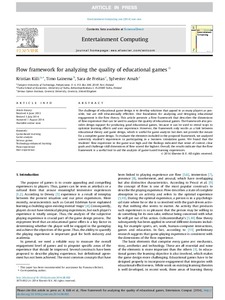Flow framework for analyzing the quality of educational games
Kiili Kristian; Lainema Timo; de Freitas Sara; Arnab Sylvester
Flow framework for analyzing the quality of educational games
Kiili Kristian
Lainema Timo
de Freitas Sara
Arnab Sylvester
Elsevier
Julkaisun pysyvä osoite on:
https://urn.fi/URN:NBN:fi-fe2021042714350
The challenge of educational game design is to develop solutions that appeal to as many players as possible,
but are still educationally effective. One foundation for analyzing and designing educational
engagement is the flow theory. This article presents a flow framework that describes the dimensions
of flow experience that can be used to analyze the quality of educational games. The framework also provides
design-support for producing good educational games, because it can be used to reveal ways to
optimize learning effects and user experience. However, the framework only works as a link between
educational theory and game design, which is useful for game analysis but does not provide the means
for a complete game design. To evaluate the elements included in the proposed framework, we analyzed
university student’s experiences in participating in a business simulation game. We found that the
students’ flow experience in the game was high and the findings indicated that sense of control, clear
goals and challenge-skill dimensions of flow scored the highest. Overall, the results indicate that the flow
framework is a useful tool to aid the analysis of game-based learning experiences
The challenge of educational game design is to develop solutions that appeal to as many players as possible, but are still educationally effective. One foundation for analyzing and designing educational engagement is the flow theory. This article presents a flow framework that describes the dimensions of flow experience that can be used to analyze the quality of educational games. The framework also provides design-support for producing good educational games, because it can be used to reveal ways to optimize learning effects and user experience. However, the framework only works as a link between educational theory and game design, which is useful for game analysis but does not provide the means for a complete game design. To evaluate the elements included in the proposed framework, we analyzed university student’s experiences in participating in a business simulation game. We found that the students’ flow experience in the game was high and the findings indicated that sense of control, clear goals and challenge-skill dimensions of flow scored the highest. Overall, the results indicate that the flow framework is a useful tool to aid the analysis of game-based learning experiences.
https://urn.fi/URN:NBN:fi-fe2021042714350
Tiivistelmä
The challenge of educational game design is to develop solutions that appeal to as many players as possible,
but are still educationally effective. One foundation for analyzing and designing educational
engagement is the flow theory. This article presents a flow framework that describes the dimensions
of flow experience that can be used to analyze the quality of educational games. The framework also provides
design-support for producing good educational games, because it can be used to reveal ways to
optimize learning effects and user experience. However, the framework only works as a link between
educational theory and game design, which is useful for game analysis but does not provide the means
for a complete game design. To evaluate the elements included in the proposed framework, we analyzed
university student’s experiences in participating in a business simulation game. We found that the
students’ flow experience in the game was high and the findings indicated that sense of control, clear
goals and challenge-skill dimensions of flow scored the highest. Overall, the results indicate that the flow
framework is a useful tool to aid the analysis of game-based learning experiences
The challenge of educational game design is to develop solutions that appeal to as many players as possible, but are still educationally effective. One foundation for analyzing and designing educational engagement is the flow theory. This article presents a flow framework that describes the dimensions of flow experience that can be used to analyze the quality of educational games. The framework also provides design-support for producing good educational games, because it can be used to reveal ways to optimize learning effects and user experience. However, the framework only works as a link between educational theory and game design, which is useful for game analysis but does not provide the means for a complete game design. To evaluate the elements included in the proposed framework, we analyzed university student’s experiences in participating in a business simulation game. We found that the students’ flow experience in the game was high and the findings indicated that sense of control, clear goals and challenge-skill dimensions of flow scored the highest. Overall, the results indicate that the flow framework is a useful tool to aid the analysis of game-based learning experiences.
Kokoelmat
- Rinnakkaistallenteet [29335]
